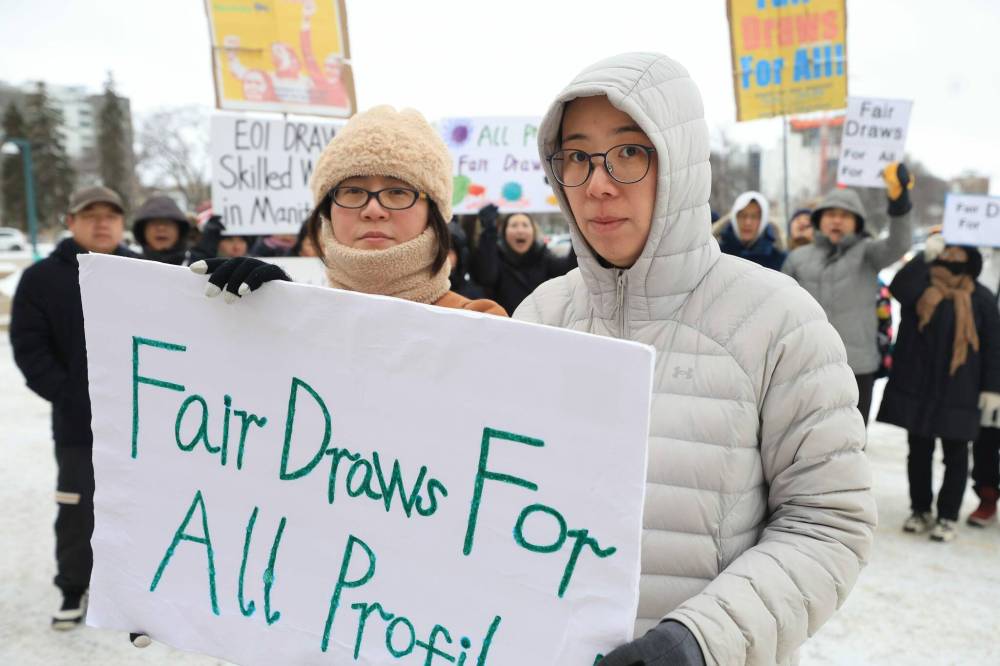Temporary work permit holders are calling on the NDP government to be more transparent about how it picks newcomers through the provincial nominee program.
So far this year, there have been four “all-profiles draws” inviting skilled workers in every field to apply for permanent residency in Manitoba. There were more than 20 in 2023.
A grassroots group that says it represents upwards of 300 foreign workers protested outside the Manitoba legislature on Wednesday morning — the latest of a series of recent demonstrations.

RUTH BONNEVILLE / FREE PRESS
Jing Zhang (left) and Tracy Jin, organizers with the Skilled Workers of Manitoba group, at Wednesday morning’s protest at the Manitoba legislature
“We’re anxious because a lot of foreign workers, we have our whole family here and our children are studying in local schools,” said Jing Zhang, who moved to Canada from China in July 2023, citing her pro-democracy position and disagreement with her home government’s policies.
“We don’t know if we should go back to our home country or we should continue to wait here.”
Under the banner “Skilled Workers of Manitoba,” Zhang and other workers have repeatedly requested a meeting with provincial officials “to discuss the necessity of sustained and transparent all-profiles draws.”
The province holds regular draws for people who hold temporary work permits or attend post-secondary institutions to seek permanent residence status.
The draws can be general or target specific groups, such as individuals with a close relative who is a permanent resident or citizen; foreign nationals who are part of a strategic recruitment initiative; or, international graduates of a local post-secondary program.
Candidates are ranked on a point system, with categories ranging from age to language skills.
During the most recent all-profiles draw, 50 letters of advice to apply were issued to skilled workers from the province. The lowest-ranked candidate on Oct. 24 had an exceptionally high score of 872.
Upwards of 100 letters were issued every time the province did a similar draw in 2023. The lowest point score ranged from 604 to 809 during that calendar year.
“The province’s priorities have changed. They’re looking at selecting workers in certain sectors as opposed to just generally. They want to target their approach. They want to target rural areas and it’s the province’s prerogative to do that,” immigration lawyer Ken Zaifman said.
Manitoba’s “friendly reputation” led Tracy Jin and her husband to pack their bags for Canada following several years of economic and social hardship in Beijing during the COVID-19 pandemic.
Jin, a financial consultant-turned-office associate, said they are less optimistic than before because of unexplained changes to all-profiles draws.
“You have such a great point-based system but you’re not really using it,” Jin said, adding it no longer feels like having a high score makes a difference given the infrequency of draws and drop in letters.
The advocacy group’s analysis suggests nine per cent of all invitations were issued to all-profiles candidates between January and October, down from more than 30 per cent in years past.
Labour and Immigration Minister Malaya Marcelino was not made available for an interview on the subject.
A representative for her office said the province continues to draw from the current pool, which encompasses more than 26,000 profiles, every two weeks “to meet the economic needs of Manitoba.”
“Since this exceeds the number of persons the (provincial nominee program) can nominate in any given year, the pool is very competitive and not everyone will be selected to apply,” the spokesperson said in a statement.
Manitoba received 6,325 provincial nominee allocations from the federal government in 2022, followed by 9,500 last year, although it did not process about 2,000 applications in time to meet what would have become a record number.
The 2024 allotment is also 9,500, and a spokesperson said the province is on track to meet it.
Zhang said protesters want frank answers about the infrequency of consideration for all eligible skilled workers — a profile that she falls into, being a former international affairs manager for an airline who is now making a living as a restaurant cook in Winnipeg.
The province specifically sought applications from foreigners with restaurant and food service management experience earlier this month.
maggie.macintosh@freepress.mb.ca

Maggie Macintosh
Education reporter
Maggie Macintosh reports on education for the Free Press. Originally from Hamilton, Ont., she joined the newsroom as a reporter in 2019. Read more about Maggie.
Funding for the Free Press education reporter comes from the Government of Canada through the Local Journalism Initiative.
Every piece of reporting Maggie produces is reviewed by an editing team before it is posted online or published in print — part of the Free Press‘s tradition, since 1872, of producing reliable independent journalism. Read more about Free Press’s history and mandate, and learn how our newsroom operates.
Our newsroom depends on a growing audience of readers to power our journalism. If you are not a paid reader, please consider becoming a subscriber.
Our newsroom depends on its audience of readers to power our journalism. Thank you for your support.